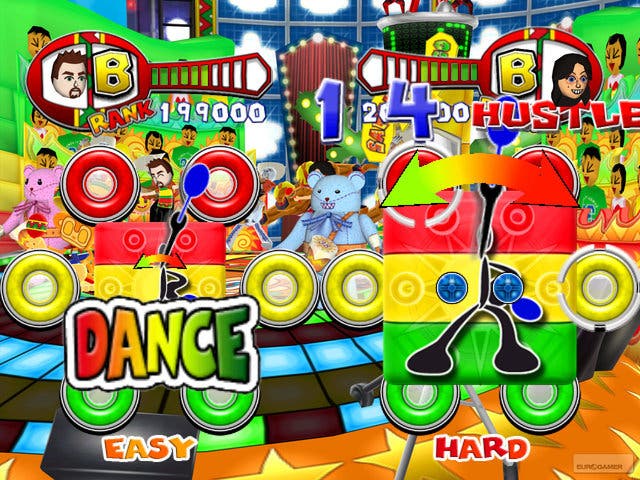Samba De Amigo
Maracaulous.
Needless to say, the imprecise nature of the controls starts to weigh heavily once you're faced with more complex routines and manoeuvres. You'll go from being able to do each song with your eyes shut to hitting a brick wall the minute you progress to Hard mode. It almost works perfectly when asking the player to perform very deliberate actions, but demands an unreasonable level of precision later on - a level of precision that is currently beyond the Wiimote. While the expensive Dreamcast system employed was capable of triangulating the position of each maraca relative to the sensor bar, Gearbox's Wii system relies on static acceleration data. While this is a clever alternative on paper, it has limitations when you're being asked to move from high to low to medium positions in quick succession - while also shaking in time. It's a nice workaround up to a point, but it doesn't quite work in the white heat of maraca-shaking insanity.
That's not to say you won't have fun with Samba De Amigo anyway. The fact that you can now easily engage in multiplayer goes some way to making up for some of the worse faults, while some of the throwaway modes are fun in small doses. There are five basic multiplayer options: Quickplay, Battle, Love Love, Classic and Mini-games. Classic is, as the name implies, the standard game. Quickplay is just you and a mate competing for the best score. Battle is a tug o' war, as you aim to pull off enough successful moves so that a bomb is lobbed over to your opponent's side and takes away some of their energy. Love Love (a.k.a. Couples) is utterly throwaway; your "compatibility" with your partner is based on how synchronised you are with one another during play.
The mini-games, meanwhile, are similarly lightweight distractions and none linger in the memory. Pinata is a rather pointless game of seeing how quickly you can bust one open, Guacamole is a basic riff on whack-a-mole, Monkey See, Monkey Do is a Simon-Says move-matching affair, and Volleyball is an unforgivably awful, completely unplayable take on the sport. Strike A Pose, meanwhile, tasks you with pulling off as many poses in the alloted time, Power Rush has you shaking the maracas as fast as possible, while Dance Dance Amigo involves keeping up with the frantic on-screen routine.

With those simple gameplay mechanics at its core, there's not a great deal of substance to Samba De Amigo once you get over the initial novelty value. But that's not, and never was the point. Its role is as drunken party distraction, with winner-stays-on contests and belly laughs as a succession of people look completely stupid while waving imaginary maracas and generally dancing around like an excitable sombrero-wearing monkey. But how long will the fun last?
Much of the potential enjoyment comes down to how much you enjoy lightweight rhythm-action party games, and how much booty-shaking latin flavoured tunes and kitsch pop you want in your life. If doing the Macarena and punching the air to Ricky Martin sounds like your idea of a top night out, then perhaps Samba De Amigo is the game for you. Me? I'm more of a dirty rock slut, so you shouldn't take any notice of what I think. Pushed into party game shame, I'd personally much rather noodle away at Rock Band and practice my rock falsetto while donning a fetching Brian May wig. Horses for courses. When it comes to monkeys shaking maracas, I'll do my best Ian Brown swagger to Fool's Gold, thanks.
Apart from the obvious fact that party games have moved on an awful lot since Samba De Amigo first appeared, there's no denying that the control system just doesn't quite translate as well as it might have - and that can only hurt its appeal in the long run. There's still a decent amount of daft fun to be had out of this joyous little game, but it's definitely best sampled in small doses.

